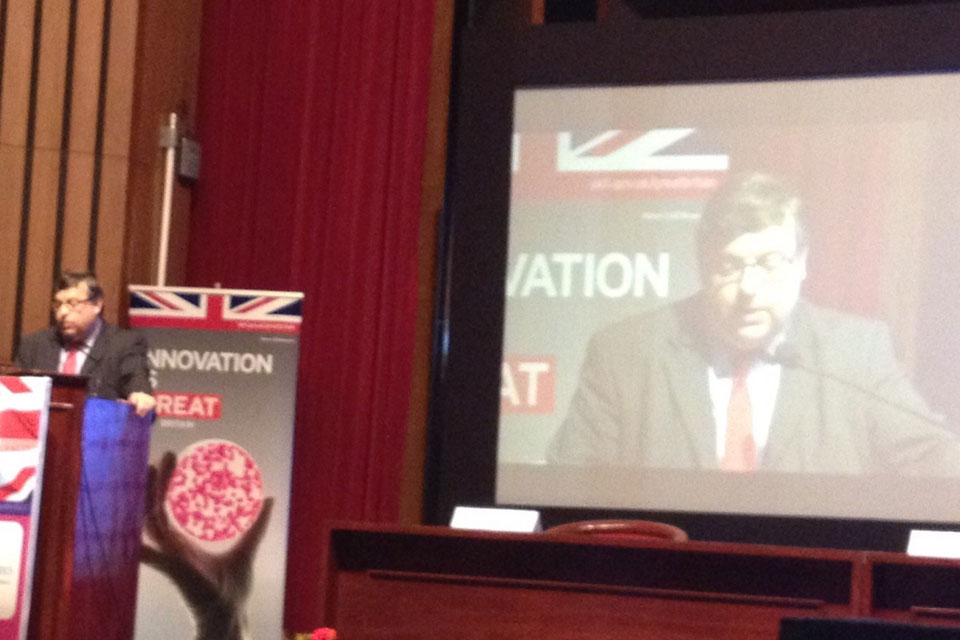Global Cancer Summit in Bengaluru
Transcript of the speech by Dominic McAllister, British Deputy High Commissioner Bengaluru, 18 November 2015.

Good Morning.
I’m pleased to be attending the Global Cancer Summit 2015.
Thank you to Dr Rao and the Global Cancer Foundation for their kind invitation.
I have been in Bangalore for only two weeks!
Prior to arriving here I was working for the UK Science and Innovation Network in the Gulf and before this, South Korea. The UK Government founded the “SIN” network to promote international research collaboration to tackle mankind’s grand challenges. Access to affordable healthcare is one of these grand challenges and cancer is a global priority.
My role in Karnataka now goes beyond research. The British Deputy High Commission works across the partnership spectrum from research and innovation at one end to commercial partnerships and investment at the other.
The UK and India have a long relationship of working together on life sciences and Oncology is a key focus.
The oncology challenge in India is significant:
- India is the 3rd largest country affected globally;
- Cancer accounts for 8% of deaths and a greater percentage of the population is personally affected;
- The high prevalence of breast, colorectal, lung, Non-Hodgkins Lymphoma, and prostrate cancers;
- Cancer treatment costs are rising at a rate of 6.5% per year and are expected to reach US$240 million by 2018.
- The UK is keen to engage with Indian partners to tackle these challenges. Bangalore is a hub for research, medical technologies and companies doing early discovery work and is the obvious place to engage. Bangalore also offers good hospitals with experience in clinical studies and advanced healthcare.
What can the UK offer?
- The UK is an world leader in cancer study right from screening and diagnosis to discovery research and healthcare delivery;
- The UK’s National Cancer Registry is a powerful tool for research and clinical trials;
- For every 100 patients diagnosed with cancer in the UK, 21 enter clinical studies including 7 in randomized controlled trials;
- 85,000 patients per year are recruited to cancer research studies (which is more than in the US);
- Cancer Research UK is the world’s largest independent cancer research charity. It works with regional health departments to support 18 experimental Cancer Medicine Centres across the UK. These centres drive the development of new therapies and bring benefits faster to patients;
- The UK is a world leader in Precision Medicine through investment in the 100,000 Genomes project and better NHS access to patient data. Precision Medicine has the power to develop new targeted therapies for cancer patients and is a growing area of opportunity for UK and Indian researchers. Our national innovation agency, Innovate UK established a Precision Medicine Catapult in April this year and has six centres of excellence across the UK.
How can the British High Commission help?
Several teams at the Deputy High Commission in Bangalore support engagement in the Oncology area working alongside Indian partners:
- The UK Science and Innovation Network (SIN) supports research networking and collaboration. Oncology work mainly happens through the Newton-Bhabha Programme;
- The UK Trade and Investment (UKTI) life science team is working with Indian partners on “Making Tomorrow’s Medicine” - a programme to support India from the UK to make tomorrows medicines. The programme supports drug design, process innovation, drug development and manufacture. A little known fact is that 25% of the medicines purchased by NHS in the UK have an Indian origin and 40% of the active ingredients used in medicine are supplied from India.
- The UK Trade and Investment (UKTI) inward investment team works with Indian companies looking to expand their operations into the UK. They offer a range of services including accessing market opportunities, relationship building, tax support, immigration support and recruiting skilled staff in the UK. These services are bespoke, professional and free of charge.
What does this mean in practice?
- Under the Newton-Bhabha Programme the UK Medical Research Council and Indian Department for Biotechnology (DBT) are funding three major global research centres. One of these, the MRC-DBT Joint Centre for Cancer Biology & Therapeutics will link the MRC Cancer Unit at the University of Cambridge with the National Centre for Biological Sciences in India to foster research on cancer biology and therapy through collaborative research programmes, translational research and capacity building.
- UKTI trade missions such at that the September 2013 Oncology Mission, which brought 14 UK companies and research institutions to India, provides the framework for companies and institutions to meet.
- Cellworks, based here in Bangalore, is working with Cancer Research UK and the Wellcome Trust on drug development for Non-Small Cell Lung Carcinomas;
- UK company Horizon Discovery have set up an operation in Bangalore. They are working on discovery research with Indian preclinical organizations;
- UK wig manufacturer, Wigomania, is now working with Appollo and Health Care Global Hospitals;
- In the opposite direction Indian life science companies have found success in the UK. These include Dr. Reddys, Aurobindo Pharma, Shasun/Strides, Microlabs, Sun Pharmaceutical, Piramal, Intas, Cadila and Wockhardt. Companies such as Cipla and Biocon are exploring oncology opportunites in the UK.
Who should I talk to?
I would be happy to meet with you to discuss your plans.
My colleague Priya Varadarajan who leads the UKTI life sciences activity across India is also here and would be happy to help. She can also put you in touch with other colleagues working in this area.
Stuart Adam, Head,
Press and Communications
British High Commission, Chanakyapuri
New Delhi 110021
Tel: 44192100; Fax: 24192411
Follow us on Twitter, Facebook, Instagram, Flickr, Storify, Eventbrite, Blogs, Foursquare, Youtube, Vine, Periscope @UKinIndia, Snapchat @UKinIndia